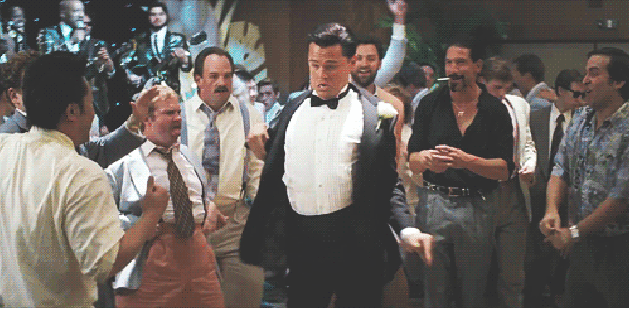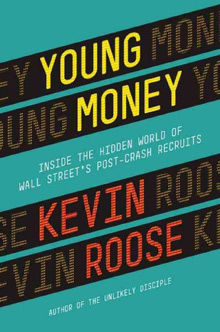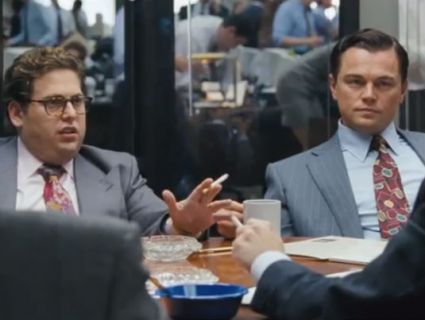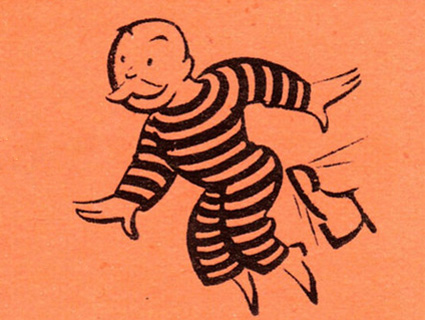
Paramount Pictures
For as long as most of us can remember, Wall Street has behaved much like a fraternity, aggressively recruiting legions of the smartest Ivy League graduates and essentially hazing them for two years. The life of a young analyst involves 100-hour weeks, countless all-nighters, dinners consisting of pizza and takeout, and soul-sucking spreadsheet after soul-sucking spreadsheet.

For Young Money: Inside the Hidden World of Wall Street’s Post-Crash Recruits, a great new read that doubles as an update to Michael Lewis’ Liar’s Poker, then-New York Times reporter Kevin Roose embedded with a batch of newbie analysts as they struggled with craven corporate hierarchies, doomed relationships, and their own personal ethics. Their stories demonstrate how the Street is changing, and how it isn’t.
In a chapter that had me on the edge of my armchair, Roose sneaked into the induction dinner of Kappa Beta Phi, an actual Wall Street fraternity whose members include major bank CEOs and hedge-fund billionaires. Check out the following bits, keeping in mind that we’re talking about some of the nation’s most powerful financiers:
After an hour, the neophytes emerged to line up for their class photo. I, and most others in the room, began to chuckle. They were dressed in women’s wigs, form-fitting leotards, gold sequined skirts and piles of stage makeup, their hairy pale legs sticking out from underneath their skirts. Some were already falling-down drunk, and the ones who weren’t were identifiable by their looks of sheer horror.
Each of the 21 Kappa inductees then had to perform a song, comedy skit, or present a video…
While they performed, other members booed, hissed, and threw wine-soaked napkins at them onstage. From my perch, I watched the neophytes give performances that, if exposed to public view, may have jeopardized some very public and lucrative careers.
You can catch the entire, hilarious chapter—in which names are named—on the website of New York magazine, where Roose is now a columnist.
An entertaining diversion. But the upshot of the book is that, while the Street’s culture may not have evolved much, America’s brightest kids are at least rethinking their priorities. Roose cites some telling stats: Only 12 percent of newly employed Princeton grads went into finance in 2012, versus 46 percent in 2006. A placement firm reported that 89 percent of financial executives were having trouble with recruiting. And the proportion of Harvard Business School grads going into financial services dropped from 34 percent to 27 percent between 2010 and 2013, while the number going into tech more than doubled, to 18 percent. Google, it seems, is the new Goldman Sachs.
I got Roose on the phone to chat about the recent changes on Wall Street, and just how in the heck he managed to stay incognito in a room full of Wall Street power players behaving badly.
Mother Jones: Describe the scene at the Kappa Beta Phi induction dinner.
Kevin Roose: That was the scariest night of my life! I heard about this fraternity that [to a journalist] sounded too good to be true. It’s an 80-year-old, very exclusive fraternity that was founded in the Depression, and most of the big movers and shakers on Wall Street are members. I spent three years studying young bankers, and I was curious to know what happens as these guys get older and move up the ladder. So I decided to go to the pinnacle of the Wall Street social scene.
I saw what amounted to a bacchanalian spectacle of excess. There were people dressed in drag doing skits. There was foie gras being eaten in black tie—things I couldn’t really believe were happening. One young banker said it’s what Occupy Wall Street would’ve invented if they wanted people to hate bankers even more. I was the first journalist in history to have gotten into this dinner, and when I eventually had to out myself, pandemonium broke out—I didn’t know whether I was going to be taken out on a stretcher. But the dinner continues still to this day. And even my crashing of the party didn’t dampen the enthusiasm.
MJ: With much-heightened security!
KR: [Laughs.] A member actually described it: “It’s like Fort Knox now.”
MJ: I’m just amazed you got in, and then sat down at a table with these guys. How on earth did you manage to go undetected as long as you did?
KR: [Laughs.] I think they thought I was a waiter, frankly. I was at least 30 years younger than most of the members, and my tuxedo was rented from where high-schoolers get their prom gear. I stuck out like a sore thumb, I thought, but I think the amount everyone had to drink probably helped.
MJ: Tell how you were outed.
KR: The New York Times‘ code of ethics states if you are asked, you have to identify yourself as a reporter. So I didn’t say much to anyone, and no one asked who I was until very late in the dinner when I took my camera out to take a picture. The guy next to me sort of grabbed me and said, “There are no pictures allowed in here—and by the way, who are you?” And I had to tell him. It was like a bomb had gone off in the room! Everyone stopped what they were doing. They saw their careers sort of vanishing before their eyes. Then a few of the members took me out into the hall and started trying to trade favors and say, “Well, if you don’t report on this or you take it easy on us, we’ll become good sources for you in the future. We’ll pick up the phone when you call.” They actually thought that would work.
MJ: You’re like, “I got the best story ever!”
KR: Yeah, I didn’t feel much sympathy for them at that point.
MJ: So give us a brief snapshot of daily life for a first-year Wall Street analyst.
KR: I think my misconception was that these guys live lives of relative leisure: work hard, play hard. To some extent they get the “work hard” right, but the “play hard” is mostly missing. Most of them will get into the office at 7:30 or 8:00 and do some work until 5:30 or 6:00 at night. When their senior managers leave for the day, they often drop another day’s worth of work on the desk and say, “I need these changes by tomorrow morning.” So then the graveyard shift starts and they often end up staying well past midnight. There’s a thing called the banker 9-to-5, which is when you work from 9 a.m. until 5 the next morning. And that’s considered a point of pride.
MJ: The Occupy movement swayed the national conversation and probably affected the presidential election, but until I read this book, I’d dismissed its effects on Wall Street proper. What did you learn in your reporting?
KR: It didn’t have much of an effect on the senior executives. They all sort of made various attempts to sympathize with the spirit of the protests, but I don’t think any of them did any soul-searching. But for the young bankers, the ones who just months before had been in college, some of them quite active in left-wing movements and in progressive causes, it really did cause soul-searching. These are people whose friends and roommates and family members were part of the Occupy movement. So for them, it was much harder to dismiss.
MJ: They felt shame?
KR: I think they did. A number of them told me that they stopped identifying where they worked when they went out in social settings. One of them said something interesting—he was at Goldman Sachs—and he said, “You know, it’s really odd to be on this side of things now.” I don’t think a lot of them had ever expected to be villainized for the decisions they’d made about their careers.
MJ: To what do you attribute the fact that fewer college grads are heading to Wall Street these days?
KR: The rise of Silicon Valley, number one. That’s put people on an alternative path where they can still get paid a lot of money, but do something that at least has the potential to be more useful. It’s also disenchantment with the long hours—people burn out on Wall Street very quickly. College seniors are willing to take a job that might not be paying them six figures, but has the kind of lifestyle they want. Also, the banks haven’t figured out how to recruit in the post-crash environment. The old lines don’t work anymore. They’re having to compete with places like Teach For America, which 1 in 6 Ivy League seniors now applies to. It’s a remarkable statistic! Those kind of organizations have become competitive with Wall Street for the best and the brightest.
MJ: How has the Street responded to the brain drain?
KR: In the past few months, most of the banks have made rules that give young bankers the weekend off—or at least one day a weekend off. I think that’s in part a retention strategy, but it’s also a recruiting move. It’s saying, “We acknowledge that talented college seniors have a lot of options and maybe Wall Street isn’t the default anymore.” They’re not panicking. They’re still getting plenty of applications, but not necessarily the caliber of applications they used to get.
MJ: The conventional wisdom is that Wall Street is business as usual. But you show that government reform is actually having an impact. Will you reflect on that?
KR: There are still outsize risks being taken on Wall Street. There are still executives behaving badly. But the basic reform structures that were put in place—Dodd-Frank and Basel III and some of the others—are actually having an effect. Banks are smaller now. They’re not as profitable. Their most lucrative trading divisions are closed. I don’t think we can claim total victory for the taxpayer or for the economy at large, but they are not the sort of devil’s playgrounds they used to be. They’re much more restrained, and I think much healthier.
MJ: What most surprised you in your reporting?
KR: There’s a difference between the people who run Wall Street and the people who work on it. I don’t think either group is morally unimpeachable—even the lower-level people participate in the structure. But it did make me sympathetic to the people who come to Wall Street because they have a lot of student debt or their parents pushed them into a high-earning profession or they’re just trying to sort of get ahead in an environment where youth unemployment is so high. And they really get sucked into this culture. I was surprised by how strong the cultural forces are. I mean, it’s like joining a religion when you go to work at a Wall Street bank.
The second thing: I was sort of surprised by how much doubt and skepticism there is. This is not a group we associate with a lot of soul-searching and self-doubt—but the analysts that I saw spent a tremendous amount of time wondering whether what they were doing was moral or ethical or whether they should be doing something else with their lives. There was a lot more moral nuance than I expected.
MJ: You mention in the book that after some time on the Street, people start erecting a shell of rationalization around themselves.
KR: Well, it’s a self-selecting group. The people who have doubts about Wall Street don’t tend to stick around very long. In a way I think that’s bad, because what you end up with is the people at the senior levels are true believers. They’re the people who will fight for Wall Street’s honor and reputation until they die. It’s good that young people who have moral qualms are getting out of the industry, but on some level you want those people to stick around and serve as a check or a compass.
MJ: You went through a selection process for the kids your were going to follow. What were you looking for?
KR: I didn’t want just eight blue bloods from Princeton. I wanted to see what it’s like for a woman. I wanted to see what it’s like for a young person of color. What is this like for someone who didn’t grow up in privilege? I wanted to see not only people at different firms, but people in different parts of different firms. It’s a very diverse group. I think in the end, I assembled a group that was very representative of the Street as a whole. I was really glad they agreed to put their jobs at risk by talking to me. And I was really happy with the stories I got out of it.
Young Money goes on sale on Tuesday, February 18.


















